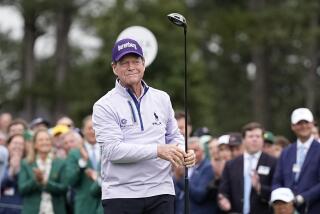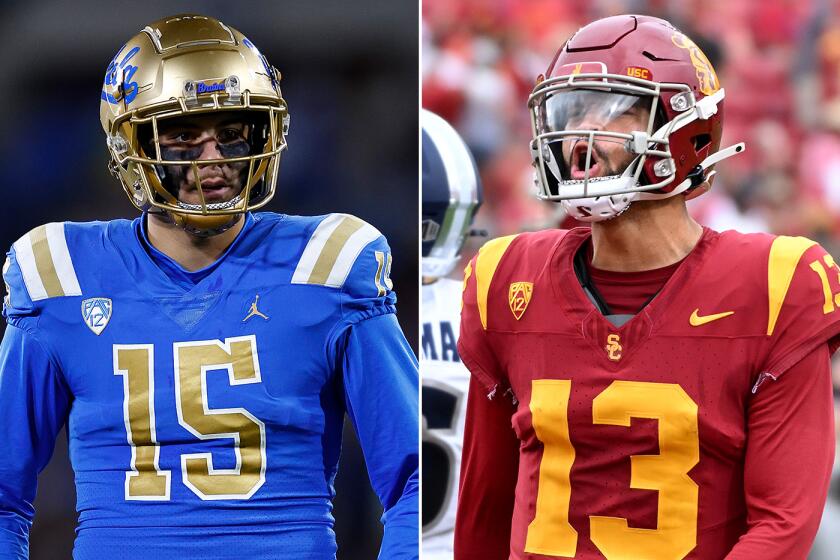Stewart Cink has a knack for rising to the occasion
In his biggest moment in golf, Stewart Cink also had his biggest opportunity to shank his entire career. A player with a deflated grasp of reality and an inflated sense of himself would have hit it into the water.
It was the 2009 British Open at Turnberry, Scotland, and this is not a new story. Yet Cink’s handling of this delicate situation remains a study in how to do the right thing at the right time.
The world had watched in breathless anticipation as 59-year-old Tom Watson stood one par away from winning his sixth British Open. At that age, and only a year after having his hip replaced, Watson stood as an inspiration to every weekend hacker who was losing 10 yards a year off the tee.
And then Cink, playing in front of Watson, made a 12-foot birdie putt on No. 18 and Watson bogeyed the 18th, bringing a four-hole playoff that Cink won in a rout.
When Watson lost, the air went out of the balloon. Golf fans who had felt younger and more limber went back to the heating pads and ice packs. The media, itching to write of one of the greatest stories in golf history, tucked the superlatives away for another day.
“I’m a sports fan,” Cink says now. “I knew what a great story Tom was. Early in the tournament, I kept looking at the leaderboard, seeing what he was doing and rooting for him, just like everybody else.”
But even with that perspective and maturity of judgment, this was Cink’s finest hour. He had won his first major and all anybody wanted to talk and write about was Watson. In his moment of glory, Cink was upstaged. Others in his spot would have been touchy, would have whined and made it clear to the media that all the attention on the runner-up wasn’t fair.
Cink never sunk to that. In the aftermath, and to this moment, he said and did the right thing.
“I understood that most of the golf world hoped the story would complete itself and he would win,” he says. “I felt it was important to recognize Tom Watson’s achievement.... “
So he did, and in so doing, Cink got the entire sports world to see him for who he really is.
Separating yourself from the pack on the tour is not easy. Pro golf tends to be perceived as a traveling troop of flat-bellied white males with vanilla personalities. Their favorite word in interviews is “focused” and their boundaries of existence appear to be 8-irons and gap-wedge grooves.
Sometimes, a name helps. Bubba Watson hits just about every par five in two, but then, we’d watch a guy named Bubba, even if he didn’t do that. We’d pay attention to a guy named Boo, even if Boo Weekley shot 75 every time out. Somebody named Tiger Woods just couldn’t be a bad player, nor a wimpy one.
Sometimes, actions speak louder than names. Arnold Palmer sounds like an English professor at Georgetown. But once he hitched up his pants, took that big swing and drafted his own army, he emerged from the vanilla.
Stewart Cink, like all of us, was saddled with the image his parents wrote on his birth certificate. If he had turned out to be a British barrister with a white wig, we would have seen a nice fit. Had he putted knock-kneed like Arnie and had thousands followed him on the golf course, carrying “Stew’s Crew” signs, the image would have been enhanced. Or, had his parents had a sense of humor and named him “Kitchen” or “In,” we would have looked at him differently.
But it took an act of maturity at the ’09 British, as much as a victory, to turn our heads. And then, about a year later, he made another gesture that spoke volumes.
It was in the news conference immediately after the Ryder Cup in Wales in October. The 12-man U.S. team, an hour or so after its devastating one-point loss, faced the press and figuratively circled the wagons around Hunter Mahan, who had chunked a chip shot and lost the final match with the Ryder Cup in the balance. Mahan was choking tears back, Phil Mickelson was speaking for Mahan when Mahan couldn’t, and Zach Johnson was patting Mahan reassuringly on the back.
Then Cink said he wanted to say something.
“Hunter Mahan was in the toughest spot in golf,” he said. “If you go up and down the line in pro golf and ask the players if they’d want to be in that spot, 50% of them would say yes, I’ll be the guy, and only 10% would mean it.”
Cink says now he misspoke, because he found out later that Mahan had volunteered to go first, not last, which some might consider even tougher. But Mahan didn’t object when sent out in the anchor match, and Cink’s articulate defense of his teammate resonates no less.
Cink is playing, although not well, in this weekend’s Bob Hope Desert Classic.
The year is young. Cink is 37, in his prime. But he can already take pride in a career made noteworthy both with good swings and class acts.
More to Read
Get our high school sports newsletter
Prep Rally is devoted to the SoCal high school sports experience, bringing you scores, stories and a behind-the-scenes look at what makes prep sports so popular.
You may occasionally receive promotional content from the Los Angeles Times.







